Ghost Dog and selective philosphy
When I saw Ghost Dog: The Way of the Samurai for the first time, it went straight onto my list of "tip top favorites". It's a rare kind of movie. Ghost Dog uses the popular, fast-paced, domestic genre of mafia hitman to deliver slow, contemplative, foreign philosphical messages. I've recently rewatched it, and although it maintains its place on the list, I have some new critical introspective thoughts on how I feel about this movie.
I think most people can admit they have at least one fictional character they see as a role model, and unique characters like Ghost Dog really lend themselves to that more than usual. Sure, he's a mafia hitman, but he spends all his free time reading Japanese philosophy, meditating, and studying martial arts. This is someone's role model for sure.
Ghost Dog reads passages from Hagakure, which is a real text written in the 1700s. Of course, I had to get ahold of it in the original Japanese. No, I can't read Japanese. Do you see where this is going. I found this PDF copy (80 MiB) which is quite complete, and some plaintext which is less complete but easier to search and run through machine translation.
There are plenty of great movies out there, and plenty that I've given the letterboxd ♥ to, but Ghost Dog gets to be a tip top favorite because those passages really stick in my memory. For an indecisive, anxious, over-thinkerly person like myself, these are inspirational:
〇一二一〜分別も久しくすればねまる、武士は七息に分別せよ
一、古人の詞に七息思案と云ふことあり。隆信公は、「分別も久しくすればねまる。」と仰せられ候。直茂公は、「萬事仕だるきこと十に七つ悪し。武士は物事手取早にするものぞ。」と仰せられ候由。心氣うろうろとしたるときは、分別も埒明かず。なづみなく、さわやかに、りんとしたる氣にては、七息に分別すむもの也。胸すわりて、突つ切れたる氣の位也。口傳。
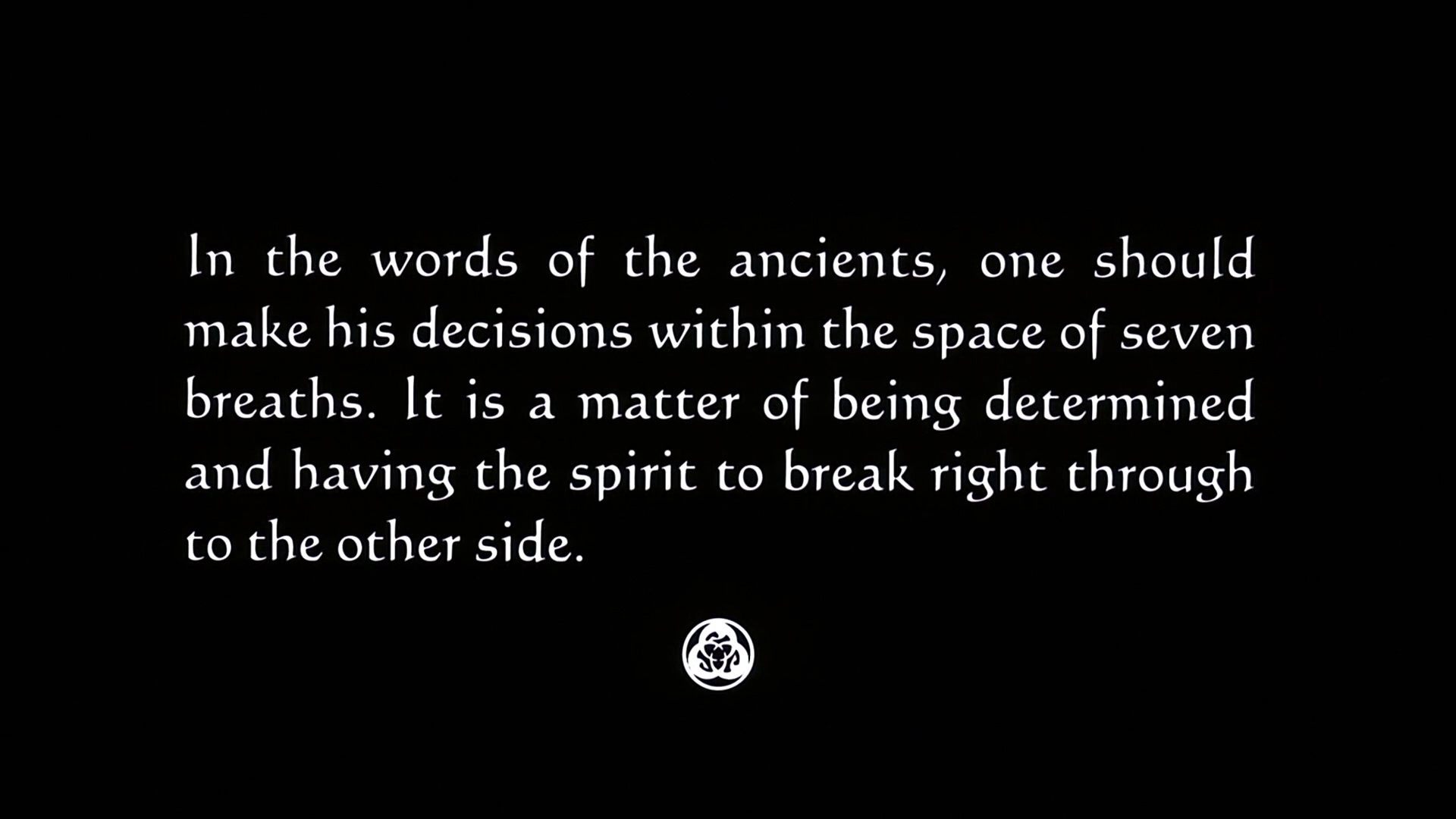
〇〇七九〜俄雨も初から思ひはまつて濡れる心に苦しみがない
一、大雨の箴と云ふ事あり。途中にて俄雨にあひて、濡れじとて道を急ぎ走り、軒下などを通りても、濡るゝ事は替らざる也。初めより思ひはまりて濡るゝ時、心に苦しみなく濡るゝ事は同じ。これ萬づにわたる心得也。
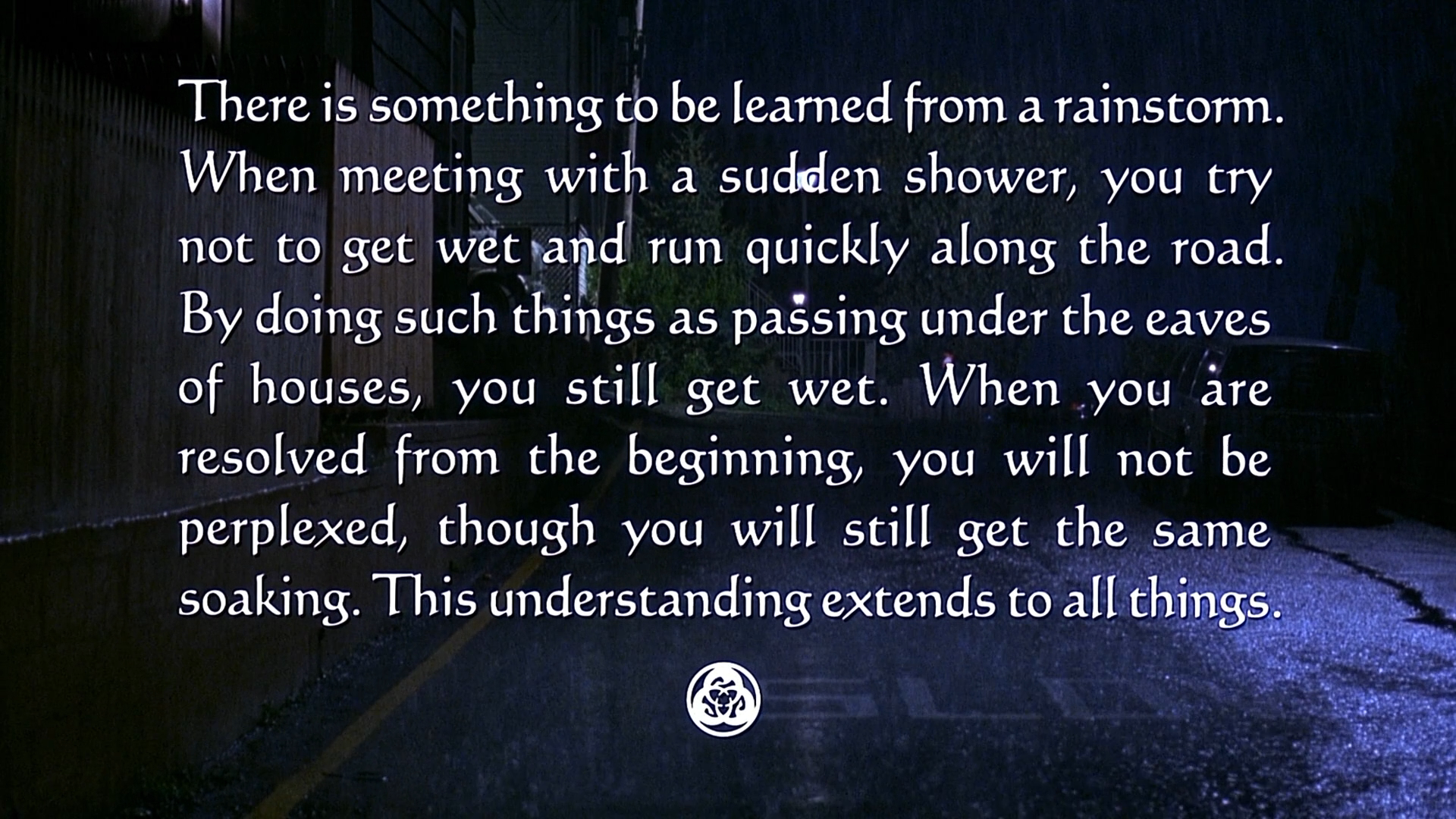
〇一八九〜時機を逸するとだるみが出來る、武道は率忽に無二無三に
一、打果すと、はまりたる事ある時、たとへば直に行きては仕果せがたし、遠けれども此の道を廻りて行くべしなんどと思はぬもの也。手延びになりて、心にだるみ出來る故、大かた仕届けず。
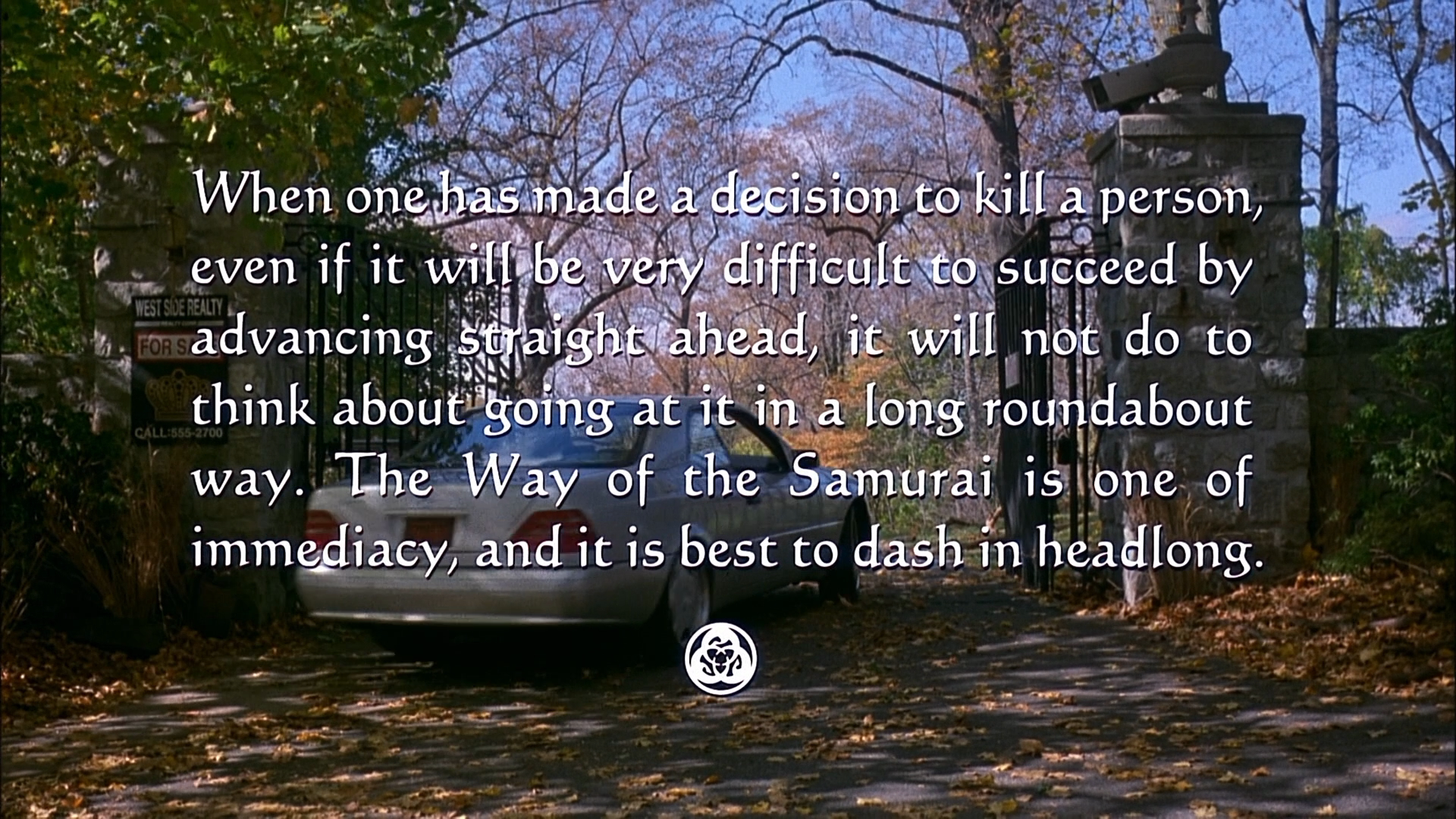
〇〇四六〜直茂公壁書「大事の思案は輕く」とは平素思案を定め置く事
一、直茂公の御壁書に「大事の思案は輕くすべし。」とあり。一鼎の註には、「小事の思案は重くすべし。」と致され候。大事と云ふは、二三箇條ならではあるまじく候。これは、平生に詮議して見れば知れて居る也。これは前廉に思案し置きて、大事の時取出して輕くする事と思はるゝ也。兼ては不覺悟にして、其の場に臨んで輕く分別する事も成り難く、圖に當る事不定也。然れば兼て地盤をすゑて置くが、「大事の思案は輕くすべし。」と仰せられ候箇條の基と思はるゝ也。
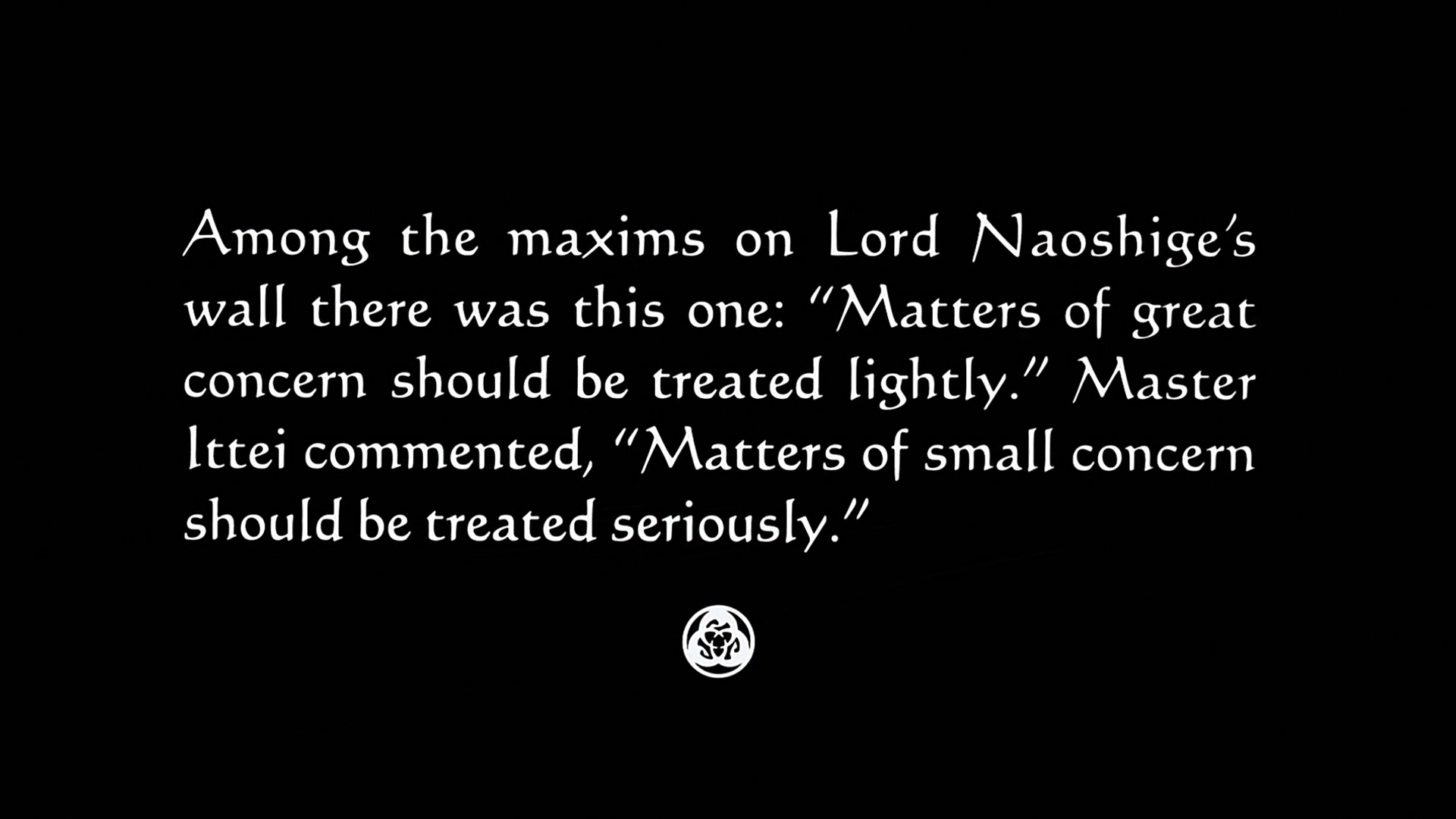
〇二四〇〜花見提重は歸りには踏み捨てる、萬づ仕舞口が大事
一、上方にて花見提重あり。一日の用事也。歸りには踏み散らして捨て候也。さすが都の心附け也。萬づ仕舞口が大事と也。

Ghost Dog pulls some great snippets out of Hagakure, and as I read through dozens and dozens of these translated vignettes it is difficult to resist the urge to paste them all here for how good they are, but I've already given you the file so you can go ahead and read them yourself.
These passages make me think wow, I should apply that to my own life. I should make decisions quickly, and stick to them. I should go into difficult situations straightforward and headlong instead of waffling at the edges. I should take pride and care in my work with the expectation that it outlives me. Hagakure tells you to be strong in your resolve, be brave in the face of doubt, be prepared for unexpected circumstances, and be ready to commit seppuku for your master at any moment. Haha wait can you say that last one again?
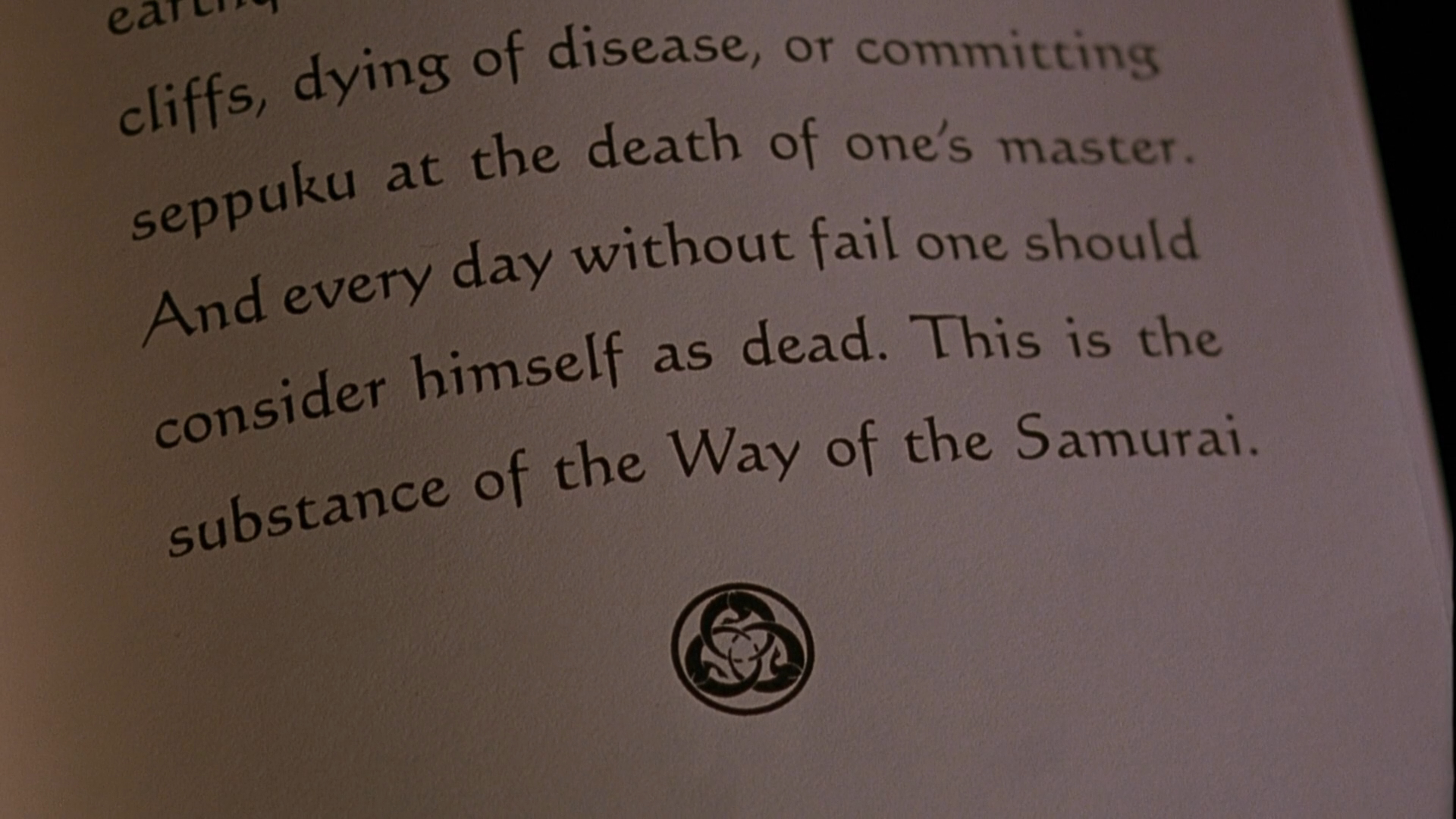
Yes, much of Hagakure is inspirational, and encourages a lifestyle of thoughtfulness and care. But along the way, it also advises us that we should swiftly murder anybody who challenges social hierarchy:
〇一八九〜時機を逸するとだるみが出來る、武道は率忽に無二無三に
一、打果すと、はまりたる事ある時、たとへば直に行きては仕果せがたし、遠けれども此の道を廻りて行くべしなんどと思はぬもの也。手延びになりて、心にだるみ出來る故、大かた仕届けず。或人、川上御經の内、渡船にて小姓酒狂にて船頭とからかひ、向へ上りて、小姓刀を抜き候を、船頭竿にて頭を打ち申し候。その時、あたりの船頭共、櫂を提げ駈集り、打ちひしぎ申すべしと仕り候。然るに、主人は知らぬ振りにて通られ候。小姓一人走り歸り、船頭共へ斷りを言ひ、申し宥め連れ歸り候。その晩、右酒狂者の大小を取拂ひ申され候由承り候。まづ船中にて酒狂者を呵り、船頭を宥めざるところ不足也。又無理にても頭を打たれてからは、斷りどころにてなし。斷り言ふ振りにて近寄り、相手の船頭打捨て、酒狂共も打捨つべき所也。主人はふがひなし也。
Do not hesitate once you have decided to cut a man down. Bypass any thoughts of postponing for alternative options premised on the excuse that diving in headfirst will likely fail. You will miss your chance, and will not accomplish your mission. In the Way of the warrior, be ready to leap headlong into the fray without a second thought.
A man went to a sutra reading at the Jissōin Temple in Kawakami. His page became intoxicated on the boat ride and started a fight with the ferryman. When the page climbed up the bank and drew his sword, the ferryman struck him on the head with an oar, and the others converged with their oars at the ready. While these events were transpiring, his master walked by as if nothing was happening. This prompted another page to run to the ferrymen and apologize for his colleague's behavior. He ushered him away from the scene while trying to mollify him. That evening, they say the drunken page had his swords confiscated.
First, the master was amiss for not scolding the page, nor did he try to pacify the ferryman. Even though the incident was sparked by the drunken page's belligerent behavior, an apology was unnecessary as the ferryman, a commoner, struck a samurai on the head. The master should have approached the ferryman as if he was going to make amends, and then cut him and his page down together. The master was sadly remiss.
And... I'm just gonna ignore that lesson because it doesn't match the value system I came here looking for. I will also disregard any passage that tells me to sacrifice my life in unwavering servitude to powerful men, since this doesn't fit with our 2025 sensibilities about social hierarchy, capitalism, and dignity as an individual:
〇〇三五〜生きながら幽靈となつて二六時中主君を守り國家を固めよ
一、今時の奉公人を見るに、いかう低い眼の着け所也。スリの目遣ひの様也。大方、身のための欲得か、利發だてか、又は少し魂の落着きたる様なれば、身構へをするばかり也。わが身を主君に奉り、速やかに死に切って幽靈となりて、二六時中主君の御事を歎き、事を整へて進上申し、御國家を固むると云ふ所に眼を着けねば、奉公人とは言はれぬ也。上下の差別あるべき様なし。此のあたりに、ぎしと居座りて、神佛の勧めにても、少しも迷はぬ様覺悟せねばならず。
The gaze of retainers today seems to be very low. Their eyes resemble those of crooks driven by covetousness and cunning. Even if a samurai seems to have spirit, this is merely a feigned exterior. A samurai is not a true retainer without placing himself in absolute servitude at the feet of his lord, thinking of himself as already dead, like a ghost, always mindful of his lord's wellbeing from the bottom of his heart, and thinking of sound solutions for the resolution of problems within the domain. This is the same for samurai who occupy stations both high and low. He must be completely unflinching in his resolve, even if it falls contrary to the bidding of the gods or Buddha.
Here's one that starts by telling us to be humble in our expectation for reward, but then veers off into seppuku again:
〇〇八七〜無實の切腹仰付けられても、一人勇み進むこそ御譜代の家來
一、何某事數年の精勤にて、我人一廉御褒美仰付けらるべしと存じ居り候處、御用手紙參り、諸人前方より祝儀を述べ候。然る處、役米加増仰付けられ候に付て、皆人案外の儀と存じ候。然れども仰付けの事に候故悦び申し候へば、何某以っての外貌振り悪しく、「面目無き仕合せに御座候。畢竟御用に相立たざる者に候故、斯くの如き行掛り、是非御斷り申し候て引取り申すべし。」などと申し候を、入魂の衆色々申し宥め候て、相勤め申し候。これ偏へに奉公の覺悟これなく、唯我が身自慢の故にて候。御褒美の事は扨置き、侍を足輕に召成され、何の料も是なきを切腹仰付けられ候時、一入勇み進み候こそ御譜代の御家來にて候。面目無きなどと申すは、皆私にて候。此所にて篤と落着くべき事也。但し曲者の一通りは別にあるべき事也。
A man believed he was owed a generous reward after serving his lord diligently for many years. His friends were quick to offer their congratulations when he received a much-anticipated letter from his lord, but he was to be disappointed. To everybody's surprise, all he was awarded was a small increase in stipend. They continued to rejoice as this was still a welcome reward, but he looked surprisingly dejected. Full of woe he lamented: "I feel so embarrassed, and find it hard to face you all. I suppose I was of little consequence to my lord after all. I will retire from service and become a recluse." His close friends consoled him, and persuaded him not to retire.
Yet, his attitude clearly demonstrates that his heart was not really in service. His main motivation was self-aggrandizement. It goes without saying that when you receive a reward, or even in the case of demotion from samurai to foot soldier (ashigaru), or if you are ordered to commit seppuku for a crime you did not commit, a hereditary retainer unflinchingly accepts his fate. Saying he was too ashamed to show his face proves that he was an egoist only concerned with his own standing. All warriors should bear this in mind, although it will be beyond comprehension for conceited rogues.
These are the passages that reveal my flawed relationship with the material. One moment I'm thinking "yes, I want to be more like that", and the next moment I'm thinking "no, that's stupid and irrelevant".
Selective philosophy.
I am reminded of the Gell-Mann amnesia effect. If you find yourself disagreeing with one part of a text, you probably should go back and reassess the parts you agreed with before, because it probably suffers from the same problems you're identifying now.
It's easy to get caught up in romanticizing the good parts of a philosophical text while conveniently ignoring the bad parts, and yet still pretending that you have been inspired by "the way". Maybe it is wise to pull bits and pieces from a variety of influences, to take advantage of the net of information we have access to that these ancients did not; or maybe it is lazy, gluttonous, and a sign of an undeveloped palate, like eating only the chocolates out of a trail mix. The good parts?
Hagakure was not written specifically to act as a rulebook. It's simply a collection of vignettes, some historical and some parabolic, and the kind of life lessons that come up in conversation over many years. So, it's not like you have to do everything it says. But it raises the question: if I'm the one deciding which parts to follow and which parts to ignore, am I allowing it to teach me anything I didn't already know? What exactly is the point of being inspired by a message if you're not going to accept the whole message, but only the parts that are convenient?
When Ghost Dog holsters his pistol, he does what he might call a flourish or perhaps 血振るい, but what I'll call "waves it around a bit" in an attempt to evoke the way one sheaths a sword after combat.
This flourish is obviously ridiculous, and pokes a rather large hole in the idea of Ghost Dog as a role model. You thought that following the ancient and mystical ways of the samurai, today in the 21st century, would make you appear enlightened, strong, and wise? No, it just makes you look like the "power of god and anime" kid.
Suddenly, Ghost Dog is a cautionary tale. The lesson is that if you spend all your time and energy pretending to be something you're not, the seams will crack open sooner or later. This smoking gun is the smoking gun here. It is an adherence to the form of 血振るい, impotently lacking its function, for of course there is no blood to be shaken off the ranged weapon. Ghost Dog waves it around a bit because he believes he's supposed to in order to look like a samurai, to maintain his image, but it's hollow. It reminds me of a child imitating a parent without understanding what they're doing.
In the age of the firearm, there are gun-native flourishes to behold. I think you'll agree this takes more skill than just waving it around a bit:
Sticking to the 血振るい is anachronism, an attempt to have it both ways despite his supposed commitment to the way. Even though Ghost Dog trains with swords at home, he does not use them in combat. He embraces modernity when it suits him — the convenience of firearms as a weapon, including a sniper rifle which I'd say is decidedly not in line with the honorable samurai ethos — but rejects modernity when he has the chance to feel superior to others. "Sometimes you gotta stick with the ancient ways", he says. But only sometimes.
Westerners have long idealized and fetishized Asian exoticism, the Japanese in particular. As an American (not to conflate Western with American, just giving my own perspective), I feel that our 250 year history seems a bit short and boring compared to what we see in other places around the world. We are hungry for things that have a thousand-year history and cool, dramatic characters like samurai and ninjas.
We like to surround ourselves with things we literally do not understand to provide the image of deep and refined scholarly taste, because if you can't understand it it must be good. Asian exoticism is more alluring than European exoticism partly because we have no hope of even pronouncing their written word; the simplest of Hanzi/Kanji look like magic runes in contrast to the Fisher-Price toyset that is our Latin alphabet.
Did you know that 愛 means love? Oh my god that's so deep.
I've included a lot of Japanese text in this article, none of which I can read nor write. That's all copy-pasted. It does no service to you, the reader, who is surely glancing past it and reading the translation instead. This article would be just was well with all that text removed. But I keep it because it serves the ego, the aesthetics, and the image of myself as someone with multicultural taste, much like Ghost Dog keeps his 血振るい.
I can't read Japanese. Can Ghost Dog read Japanese? It's not necessarily ruled out by the film, but I don't think so, considering his copy of Hagakure is in English. But he decorates his walls with Japanese newspaper:

The content of the newspaper is probably typical and boring, and if it were written in English it would be worthless. Its value as decoration comes solely from the fact that we don't know what it says. You'd probably think I'm singing 'bout some pretty serious stuff.
A movie like Ghost Dog is catnip for a person like me: someone with a fetish for Asian culture, unusual artsy film, and a philosophical bent. But in asking myself why people like me latch onto these types of movies, characters, and messages, I find it is not as easy as saying you want to be more like that. More like which parts, exactly? The good parts, but not the bad. The easy parts, but not the hard.
Sometimes, it is difficult to figure out whether you really believe something because it aligns with your value system, or you believe it because it is easy. If someone told you that you should be ready to commit seppuku for your master at any moment, you'd reject it immediately because it doesn't align with our modern beliefs about the value of human life. But are you actually sure there's no enlightenment to be gained from getting yourself into that state of mind? No, you're not really sure, and you're not willing to put in the effort to find out. Is this a belief or a convenience?
And of course, the amount of philosophy, advice, beliefs, and rulebooks available for you to pick from is so huge and intracontradictory that you'll only ever practice a tiny portion of it. You could choose to dedicate your life to the Samurai way, or the Buddhist way, or the Catholic way, or...? You only get one life (well, maybe Buddhists would disagree), so you either stick with one Way the whole time and miss out on the others, or dabble in each and miss out on the experience of being truly dedicated to any of them. When you bail out of one school of thought, is that because you lack the discipline to stick with it, or because you actually don't believe it? And is that really a lack of discipline, or is it a realization that our assumption of difficult=good is not true?
You can't just pick up a rulebook and follow along, because as soon as you throw out any of the rules, then you're guiding the rulebook instead of letting it guide you. Even Ghost Dog, who is in fact willing to kill and die by the code, breaks parts of the code for his convenience. I also find that if you try too hard to slavishly adhere to a sacred code, you wind up carrying forward some emptily performative aspects like the 血振るい which lack meaning in their modern application. And worst of all, we have a weak spot for foreign exoticism, which bypasses our logic centers on the assumption that difficult=good, even though there's probably plenty of insightful philosophy to be found domestically. Put this all together and what even is anything worth believing if I'm going to be the one picking and choosing what stays, and my choices come from what I already believe?
The majority of this article was written in December 2024 / January 2025, back when "recently rewatched" was a truer statement. I have been stuck sitting on this for a few months because I haven't been able to figure out a real point. It is easy to complain and not easy to say something more constructive, but I can't publish without something constructive. I also can't figure out if this has gone way too far into fake-deep, navel-gazing territory or if it actually means anything.
I will answer my own questions at least a little bit. Taking inspiration from these texts, even if only the parts that align with my existing values, can help by giving me a vocabulary with which to express those values. Vocabulary in and of itself is a very important part of our ability to think at all; see linguistic relativity (not that I agree with everything theorized there). Next time I am stuck on a decision for too long, I can think to myself "seven breaths" instead of "golly, I wish I wasn't so indecisive". And when I have used something up beyond its working life, or it's time to say goodbye to a person or place, I can think "the end is important in all things" — I've already dropped that one in the chat at work. These are shorthand for a larger thought, and that is worth something.
Furthermore, reading these texts can help me learn more about myself by confronting me with ideas I hadn't specifically considered before, and forcing me to decide whether I agree with it or not based on other ideas I've had in the past. Even if the bases for my opinions already existed within me, the act of consciously deciding yes or no can help me understand what exactly those opinions are. To put it another way, even if you have all the ingredients for a cake in your pantry, there is value in actually baking the cake instead of sitting back and saying yeah, there's basically the equivalent of a cake in there somewhere.
So far I have criticized Ghost Dog (the man) for not following The Way with absolute purity, and that's part of my problem. No matter which Way you try to follow, it is unlikely anyone can or even should be so dogmatic. The authors of the texts probably didn't follow it that well, and in fact it's probably the other way around: if the author is trying to convince you to sacrifice your life for their benefit, or live in a way that empowers them, they are probably not following the same rules they set out for you. And even if they were genuine, it doesn't mean they were right. This again leaves you as the judge of what is worth believing and following.
I'll have to say again that Ghost Dog (the movie) remains on my list of tip top favorites. The best thing art can do is make you think.
I am still not satisfied with this conclusion. I keep stretching this article out longer and longer, telling myself it's not ready to publish because the thought process has not come to an end. But you know what they say.
Contact me: writing@voussoir.net
If you would like to subscribe for more, add this to your RSS reader: https://voussoir.net/writing/writing.atom